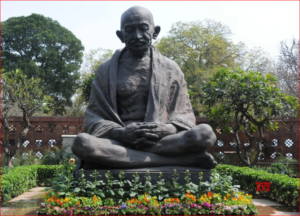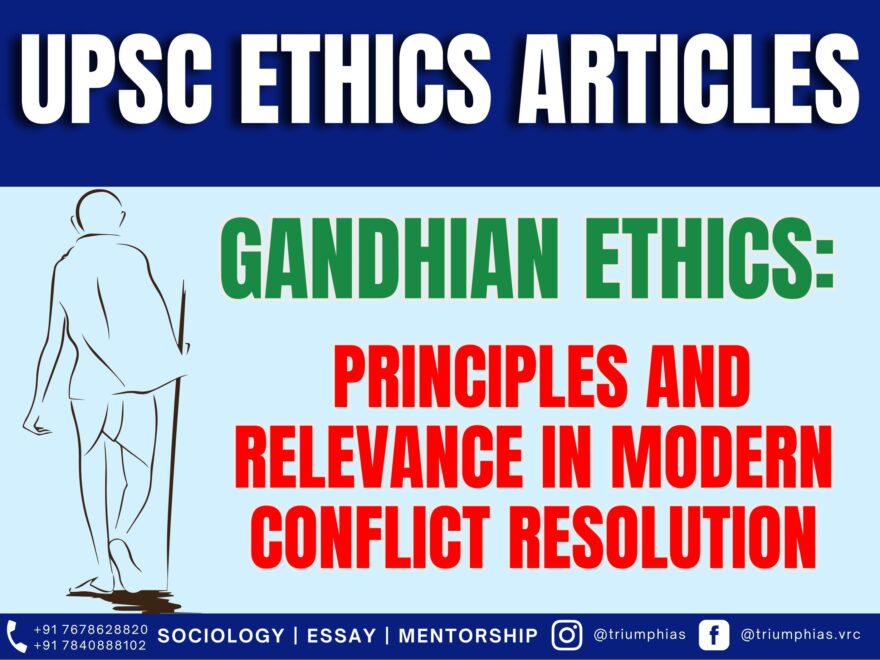Gandhian Ethics
(Relevant for Ethics, Integrity and Aptitude)

Gandhian Ethics
The aim of Gandhian philosophy is to bring about a simultaneous transformation in both the individual and society. This philosophy draws inspiration from various sources such as the Bhagavad Gita, Jainism, Buddhism, the Bible, Thoreau, Gopal Krishna Gokhale, Tolstoy, John Ruskin, and many others.
Gandhian thought is intrinsically linked with ethics; it cannot be fully detached from it. His concepts are typically articulated using moral concepts and language. Ethical theories serve as the foundation for Gandhian thought across various domains.
Major Principles of Gandhian Ethics:
Satyagraha: This concept involves a continuous pursuit of truth. It primarily encompasses self-sacrifice, peace, and non-violence. Following satyagraha requires strong willpower and determination.
Trusteeship: Gandhi ethics advocated that wealthy individuals should act as trustees of resources that are meant for the welfare of the people.
Ends and Means: Gandhi ethics consistently stressed the importance of the purity of means. In his view, improper methods should not be employed to achieve legitimate goals. Just as a wrong path cannot lead to the right destination, unethical means cannot bring about ethical ends.
Concept of seven sins: Gandhi ethics identified seven sins in society that need correction: Wealth without work, Pleasure without conscience, Knowledge without character, Commerce without morality, Science without Humanity, Religion without Sacrifice, and Politics without Principle.
Sarvodaya: This term signifies the universal upliftment of all members of society. By embracing inclusivity, many societal ills can be eliminated.
Dignity of Labor: Gandhi promoted the idea of equality among all by making honest labor, such as bread labor, mandatory for everyone.
Role of Gandhian Ethics in conflict resolution:
- The Gandhian approach to conflict resolution relies on satyagraha, which has been described as passive resistance or nonviolent resistance. According to Gandhi, satyagraha is the commitment to Truth.
- A person practicing satyagraha attains a level of freedom that others may find elusive, as they become truly fearless individuals. Once fear is eradicated from their mind, they will never consent to be enslaved by another. With this state of mind, they will never yield to any arbitrary actions.
- Satyagraha transcends being merely a conflict resolution technique that can be scientifically analyzed. It is, in essence, an ethical framework that places significant importance on the quality of relationships between individuals.
- In Gandhian ethics, emphasizing mutual satisfaction with the resolution outcome is crucial for conflict resolution.
- Nonviolent action is the primary method in the conflict resolution process. This technique involves protest, resistance, and intervention without resorting to physical violence.
In today’s world conflict is complex and further, incorporates the utilization of physical and psychological violent instruments. The Gandhian approach addresses conflict at the individual level. Gandhi’s approach is still highly important in modern complicated conflict resolution, and there is a need to revitalise and resurrect the concept at the level of conflict resolution institutions.
Sample Question for UPSC Sociology Optional Paper:
Question 1: What is the essence of Satyagraha in Gandhian ethics?
Answer: The essence of Satyagraha in Gandhian ethics is the continuous pursuit of truth through non-violence and self-sacrifice, emphasizing strong willpower and determination.
Question 2: How does the concept of Trusteeship function in Gandhian ethics?
Answer: In Gandhian ethics, Trusteeship advocates that wealthy individuals should act as trustees of resources, using them for the welfare of society at large.
Question 3: How does Gandhi’s principle of ‘Ends and Means’ relate to ethical decision-making?
Answer: Gandhi emphasized the purity of means in achieving any end, positing that unethical means can never achieve ethical ends.
Question 4: What are the ‘Seven Sins’ identified by Gandhi, and how do they relate to societal issues?
Answer: Gandhi identified seven societal sins: Wealth without work, Pleasure without conscience, Knowledge without character, Commerce without morality, Science without humanity, Religion without sacrifice, and Politics without principle. These sins serve as a cautionary framework for individual and societal behavior.
Question 5: How is Gandhian ethics relevant in modern conflict resolution?
Answer: Gandhian ethics, particularly the concept of Satyagraha, provides an ethical framework for conflict resolution that emphasizes non-violence, truth, and mutual satisfaction, making it highly relevant in addressing modern complex conflicts.
Related Blogs …
To master these intricacies and fare well in the Sociology Optional Syllabus, aspiring sociologists might benefit from guidance by the Best Sociology Optional Teacher and participation in the Best Sociology Optional Coaching. These avenues provide comprehensive assistance, ensuring a solid understanding of sociology’s diverse methodologies and techniques.
Gandhian ethics, Gandhian ethics upsc, Gandhian ethics sociology, Gandhian ethics essay, Gandhian ethics economic, Gandhian ethics book, Gandhian ethics what are gandhian values, ethics of gandhiji, what is gandhian approach, Gandhian Ethics, Satyagraha, Trusteeship, Ends and Means, Seven Sins, Sarvodaya, Dignity of Labor, Conflict Resolution, Nonviolence, Moral Philosophy, Indian Ethics
Choose The Best Sociology Optional Teacher for IAS Preparation?
At the beginning of the journey for Civil Services Examination preparation, many students face a pivotal decision – selecting their optional subject. Questions such as “which optional subject is the best?” and “which optional subject is the most scoring?” frequently come to mind. Choosing the right optional subject, like choosing the best sociology optional teacher, is a subjective yet vital step that requires a thoughtful decision based on facts. A misstep in this crucial decision can indeed prove disastrous.
Ever since the exam pattern was revamped in 2013, the UPSC has eliminated the need for a second optional subject. Now, candidates have to choose only one optional subject for the UPSC Mains, which has two papers of 250 marks each. One of the compelling choices for many has been the sociology optional. However, it’s strongly advised to decide on your optional subject for mains well ahead of time to get sufficient time to complete the syllabus. After all, most students score similarly in General Studies Papers; it’s the score in the optional subject & essay that contributes significantly to the final selection.
“A sound strategy does not rely solely on the popular
Opinion of toppers or famous YouTubers cum teachers.”
It requires understanding one’s ability, interest, and the relevance of the subject, not just for the exam but also for life in general. Hence, when selecting the best sociology teacher, one must consider the usefulness of sociology optional coaching in General Studies, Essay, and Personality Test.
The choice of the optional subject should be based on objective criteria, such as the nature, scope, and size of the syllabus, uniformity and stability in the question pattern, relevance of the syllabic content in daily life in society, and the availability of study material and guidance. For example, choosing the best sociology optional coaching can ensure access to top-quality study materials and experienced teachers. Always remember, the approach of the UPSC optional subject differs from your academic studies of subjects. Therefore, before settling for sociology optional, you need to analyze the syllabus, previous years’ pattern, subject requirements (be it ideal, visionary, numerical, conceptual theoretical), and your comfort level with the subject.
This decision marks a critical point in your UPSC – CSE journey, potentially determining your success in a career in IAS/Civil Services. Therefore, it’s crucial to choose wisely, whether it’s the optional subject or the best sociology optional teacher. Always base your decision on accurate facts, and never let your emotional biases guide your choices. After all, the search for the best sociology optional coaching is about finding the perfect fit for your unique academic needs and aspirations.
To master these intricacies and fare well in the Sociology Optional Syllabus, aspiring sociologists might benefit from guidance by the Best Sociology Optional Teacher and participation in the Best Sociology Optional Coaching. These avenues provide comprehensive assistance, ensuring a solid understanding of sociology’s diverse methodologies and techniques. Sociology, Social theory, Best Sociology Optional Teacher, Best Sociology Optional Coaching, Sociology Optional Syllabus.
Best Sociology Optional Teacher, Sociology Syllabus, Sociology Optional, Sociology Optional Coaching, Best Sociology Optional Coaching, Best Sociology Teacher, Sociology Course, Sociology Teacher, Sociology Foundation, Sociology Foundation Course, Sociology Optional UPSC, Sociology for IAS,
Follow us :
🔎 https://www.instagram.com/triumphias
🔎https://www.youtube.com/c/TriumphIAS
https://t.me/VikashRanjanSociology
Find More Blogs
|
Scope of the subject and comparison with other social sciences |
|||
|
|
|
|
Modernity and social changes in Europe |

